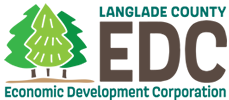Introduction to Financial Management
Overview
Whether you are starting a new business or looking to organize your current business’ finances, accurate financial information is one of the most valuable tools you have to drive success. This course seeks to set participants on the right path by providing a “101” overview of financial bookkeeping, accounting terminology and concepts, a breakdown of the key financial statements, and a brief introduction to financial management.
This class is designed for participants who:
- Do not have an accounting background.
- Would benefit from breaking down the components of each of the “Big 3” financial statements – the Profit & Loss (Income) Statement, the Balance Sheet, and the Statement of Cash Flow
- Are unsure how to organize financial information to ensure accurate records
- Have already built a business plan (formal or informal), and can answer basic information about their revenue streams, pricing, costs, etc. Haven’t nailed down these details yet? Consider taking Biz Smart Sprint or the Entrepreneurial Training Program
- May be uncomfortable with “the numbers side” of the business and are looking to increase familiarity
- Are looking for an introduction to key financial tools and concepts, or those who are looking to revisit these topics
- Have recently taken on financial support roles in their business, or who need a general understanding of accounting to be successful in their roles
- Work with a professional accountant, but want to maximize that investment by knowing the basics and being able to focus on strategy
Learning objectives
- Establishing a good organizational system and clear accounting processes
- Develop a basic understanding of accounting terminology
- Understand the key components of the “Big Three” financial statements – balance sheet, P&L statement, and cash flow statement
- Learn more about the impact of breakeven on the bottom line
- Practice a few examples of analyzing financial information to understand how your numbers relate to your business
- Help you “put the narrative to the numbers” and begin to be able to ask questions about what you see in your financial statements. By working with your team and/or accountant, you will first be able to understand what is happening, and eventually be able to make incremental improvements.
This course does not:
- Teach specific recordkeeping tools or software
- Provide personalized financial advice
- Discuss tax planning – tax laws are complex, highly individualized, and change regularly; seek the advice of an accounting tax professional

BONUS! Custom Workbook!
BONUS! Based on feedback from our clients – believe it or not, they asked for homework! – we designed a custom workbook to accompany the class content. Whether you are brand new to financial concepts or refreshing your memory, this workbook helps you connect the concepts we are learning in class to the context of your business – and provides a blend of concepts and calculations to help you make meaning from what you are learning. We believe that by being able to identify and thoroughly understand the components of your three key financial statements and business model, you will be much better equipped to make clear financial decisions in the future. The workbook also gives you the chance to make some basic calculations on your own time, along with an explanation of the answer and meaning so that you can begin to understand some of the financial information in your own context.
Registration Spring 2024
Location: Online, Live virtual sessions via Zoom. Course link will be sent out shortly before the first session.
Time: LIVE VIRTUAL SESSIONS Dates & Times – all sessions take place from 4:00 pm – 5:45 pm CST
- Monday, March 4, 2024 | Session 1 – Class introduction, recordkeeping, establishing strong accounting practices
- Monday, March 11, 2024 | Session 2 – Financial Statements (overview) and the Income Statement/P&L
- Monday, March 18, 2024 | Session 3 – Balance Sheet
- Monday, March 25, 2024 | Session 4 – Cash Flow Management
- Monday, April 1, 2024 | NO CLASS FOR SPRING BREAK
- Monday, April 8, 2024 | Session 5 – Beginning Financial Management
Course Fee: $259 (includes custom course workbook)
Registration Deadlines
| Registration type | Date | Fee |
| Earlybird | Earlybird closes: 2/19/2024 | Earlybird Registration Fee: $229 |
| Late Registration | Late Registration begins: 2/28/2024 | Late Registration Fee: $284.90 |
| Course registration closes | 3/3/2024 | — |
Register here for Spring 2024 or call 608-262-2451 to register. BONUS: Purchase 2 or more SBDC classes in a single transaction, and receive 10% off the registration fee using discount code SBDC10.
Registration & Cancellation policies
- Payment will be required at time of registration. You must have either a credit card or valid UW-Madison funding string to be able to register.
- Cancelations at least 24 hours before the program begins will incur a $25 cancellation fee. Cancelations less than 24 hours before the start of the program will incur the full program fee. To cancel, call registration at 608-262-2451. Please note that in the case of a cancellation (by either the participant or the SBDC), participants can only be transferred one time into a new course.
Disability Statement: Reasonable accommodations for persons with disabilities will be made if requested at least two weeks in advance. Contact the UW-Madison SBDC office at sbdc@bus.wisc.edu to request accommodations.
